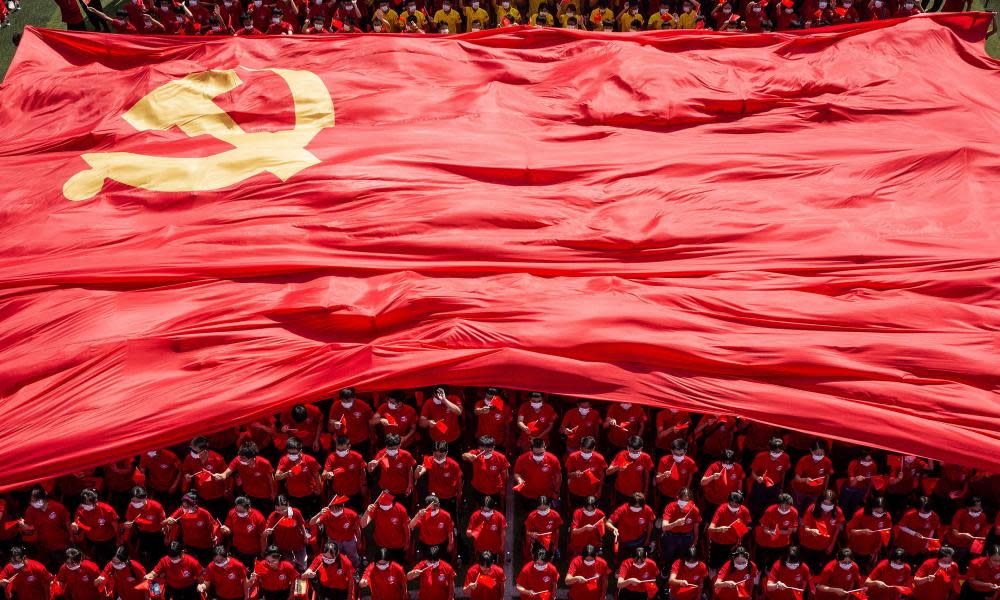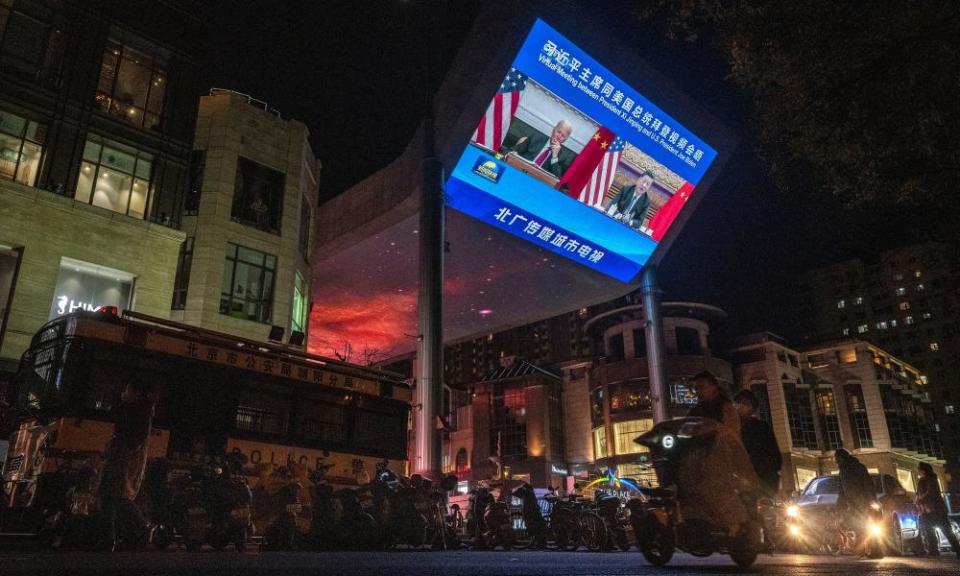China’s decisive turning point: will it side with Russia and divide the world?

- Oops!Something went wrong.Please try again later.
- Oops!Something went wrong.Please try again later.
- Oops!Something went wrong.Please try again later.
Joe Biden is due to make a phone call to Xi Jinping on Friday at a potential tipping point in China’s role in the world as it decides how far to go in backing Russia’s war on Ukraine.
While China has abstained on United Nations security council resolutions on the invasion, it has sided with Moscow rhetorically, echoing Russian talking points blaming Nato, and recycling conspiracy theories, and the Biden administration believes it has already decided to bail Russia out economically.
Related: How close are China and Russia and where does Beijing stand on Ukraine?
At a meeting in Rome on Monday between the US national security adviser, Jake Sullivan, and his Chinese counterpart, Yang Jiechi, the Chinese delegation stunned US officials by echoing debunked Russian claims that the US and Ukraine had been pursuing a secret biological weapons programme together. The Americans came away from Rome more pessimistic than ever about Beijing intentions.
“There are lots of indications that the Chinese are doing more behind the scenes to support Russia, in every sector: financially, economically and militarily,” one official said. “And that’s deeply troubling. If they continue on this path, it will be a decisive turning point that will likely lead to much deeper anxiety in Europe about China and a more profound schism between Washington and Beijing.”
Members of Congress have warned that if there is evidence of Chinese military aid to the Russian campaign in Ukraine, they will impose punitive economic measures. Corporate leaders are also likely to reassess their business with China, along with European governments.
China cannot provide military aid to Russia and still remain on the legal sidelines
Former Pentagon legal counsels
In his phone call with Xi, Biden will reprise some of the arguments Sullivan made in Rome: that the Chinese leader has been wrong about Vladimir Putin, about Russian intentions towards Ukraine, and the strength of its military. He will argue that it is not in Chinese interests to double down on a mistake and to back a loser.
Adding to the downsides, the UN’s international court of justice on Wednesday ordered Russia to halt its military operations in Ukraine. The Chinese judge voted against the ruling, but under the UN Charter, China is still legally bound by the decision.
“China may be tempted to support Russia in its conflict with Ukraine,” Oona Hathaway and Ryan Goodman, both former Pentagon legal counsels, wrote in the Just Security blog, pointing out that supplying weapons “would implicate China directly in Russia’s illegal war” and could expose Beijing to sanctions.
“China cannot provide military aid to Russia and still remain on the legal sidelines,” they argued.
‘There is still a window before China loses its wiggle room’
Since the Rome meeting on Monday, there have been a few signs of China continuing to hedge its bets, enough to give some hope in Washington that all is not lost. Chinese state-run television channels began to show footage of the devastation wreaked on Ukrainian cities, though they have yet to call it a war or an invasion. The Chinese ambassador to Ukraine assured his hosts: “We will always respect your state.”
Related: China is squirming under pressure to condemn Russia. It can’t hold out forever | Richard McGregor
The German paper Bild reported that Russia’s foreign minister, Sergei Lavrov, had been on his way to Beijing on Thursday but had turned his plane around and returned to Moscow for unknown reasons. A US official confirmed the incident but cautioned it was too early to tell its significance, speculating that China was “perhaps wanting to downplay public displays” of amity.
On 12 March, Prof Hu Wei, the vice-chairman of the policy research centre attached to the State Council, wrote an article on China’s Ukraine dilemma, noting that Putin’s military effort was faltering.
“China cannot be tied to Putin and needs to be cut off as soon as possible,” he argued. “At present, it is estimated that there is still a window period of one or two weeks before China loses its wiggle room. China must act decisively.”
The Mandarin version of the article was censored soon after it appeared. The pessimistic view within the Biden administration is that Xi is not listening to such voices and has made his pact with Putin an overarching priority aimed at blunting US power and influence at all costs. The two leaders have met 38 times in the past nine years, and in February pledged the relationship would have “no limits”.

The repercussions from the Ukraine war have already spread into the Indo-Pacific, where a small democracy’s resilience in the face of a far more powerful autocracy has local relevance in the shape of Taiwan. US allies in the region have joined in the sanctions on Russia, including Australia and Japan, which announced new measures on Friday, and in some cases sent military supplies.
A division of the world into two camps, along political and economic lines, would represent a profound dilemma for India, which has been trying to stay on the fence over Ukraine.
Related: China has little to gain but much to lose as Russia’s ally | George Magnus
“For India, one of its foreign policy objectives is to keep Russia from getting even closer to China,” Tanvi Madan, the director of the India project at the Brookings Institution, said. She added that India has seen Russia historically as a supporter of last resort in its rivalry with China, and its primary arms supplier.
“They have at the very least hoped for Russia neutrality to keep Russia from tilting towards China, particularly in a crisis,” Madan said. If Russia drifts towards dependence on Beijing because of its misjudgments in Ukraine, Moscow’s support for India is no longer guaranteed in a confrontation with China, like the clash in the Himalayas last year.
“That is leading to a discussion in India in terms of needing to reduce India’s over-dependence on Russia for military supplies,” Madan said.
Europe too would find itself with hard choices to make about its economic links with China, as the schism grows over Ukraine.
“As Xi Jinping positions himself and China as the leading power in an authoritarian bloc, it would make it almost impossible for any European democracy to grow close to Beijing,” said Abraham Denmark, a former US deputy assistant secretary of defence for East Asia, now at the Wilson Center thinktank. “It would be a dramatic shift in the geopolitical balance of power.”

